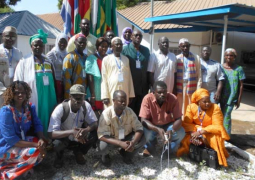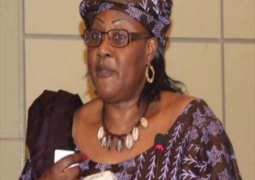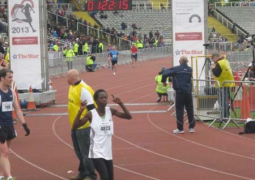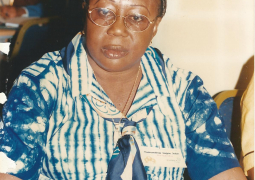Women all over the world are gathered in New York at the 54th meeting of the Committee On the Status of Women ('CSW 54'), to take stock of progress made since the adoption of the Beijing Platform for Action in 1995 ('BPFA'). This Forum provides women all over the world the opportunity to exchange and share ideas, expertise and experience in relation to progress made, opportunities and challenges in the implementation of the BPFA, CEDAW, MDG's (especially MDG 3 relating to the rights of women), and all international best practices, policies and instruments guaranteeing and ensuring that women are accorded and enjoy their full rights and dignity in all aspects of life; political, social and economic.
This important meeting for women also coincides with the commemoration of International Women's Day. Every year, the 8th of March is dedicated to the celebration of women's successes, achievements, and accomplishments in all aspects of human development. The theme for this year's commemoration is "Equal Rights, Equal Opportunities, Progress for all." This theme underscores the fundamental truth, that human progress and development is totally dependent on equal right and equal opportunity in all spheres of life for all human beings irrespective of gender, race, political, social, economic or any other form of affiliations.
As we celebrate International Women's day In The Gambia, we should also take stock of the strides made in the advancement of women, the challenges, constraints and shortcomings, and map a way forward for the realization of the theme for this year. In other words, let us ask: Are we enjoying equal rights and opportunities to ensure sustainable progress for all in The Gambia?
To answer this question, we need to closely examine progress registered by The Gambia, since the submission of its last report to the CEDAW Committee in fulfillment of its obligation under the Convention. Some of the gains made are as follows:
- Increased female representations at key decision-making levels. Women ministers including the Vice President comprise 33.3% of the Cabinet.
- Increased enrolment rate of girls at the basic educational level.
- The Maternal Mortality Ratio (MMR), though still high, declined from 730/1 00,000 live births in 2001 to 556/100000 live births in 2006.
- The Neonatal Mortality Rate was 31.2 /1000 live births in 2001 down from 60/1000 live births.
- The Infant Mortality Rate (IMR) was 75/1000 live births, down from 97/1000 in 1993.
- The U5 Mortality Rate was 99/1000 live births down from 134/1000 live births in 2001.
- In 2004 The Gambia's HIV prevalence was 2.1% for HIV1 and 0.8 for HIV2. It is higher amongst females (54%) than in males (46%). In 2007, the HIV prevalence dropped to 1.4% for HIV 1 and 0.8% for HIV 2.
- A comprehensive legal framework exist for combating Trafficking in Person's especially women and girls, the Protection of The Girl child and ensuring access to justice, through the enactment of the Trafficking in Persons Act 2008, the Children's Act 2005 and the Legal Aid Act 2008.
- A Draft Women's Bill that seeks to domesticate both CEDAW and The Protocol to the African Charter on Human and Peoples Rights on the Rights of Women in Africa is presently going through the legislative process for ultimate enactment by Parliament.
Whilst we celebrate our successes in The Gambia, we should by no means be complacent. We must acknowledge that these gains made thus far, still fall far short of the realization of equal rights and equal opportunities for the progress of all in The Gambia. By the short fall, we mean:
1.The challenges posed by socio cultural barriers to the progress of women, far outweigh the gains made.
2.The lack of strong institutions to implement the policies and laws put in place to address gender imbalances remains a problem.
3.The failure to implement laws like the Legal Aid Act 2008, limits and impedes access to justice for the poor and vulnerable women. Poverty still has a female face in The Gambia.
4.The Children's Act 2005, though innovative and progressive, is yet to be fully implemented. Since its enactment in 2005, there remains inadequate detention facility for female child offenders, who are often detained with adult offenders.
5.There is no legal framework to address violence against women in all its forms.
6.The representation of women at the National Assembly remains dismally low.
We should work with concerted effort to ensure the realization of equal rights, equal opportunity and progress for all in The Gambia and beyond. Women and men should use their expertise and experience in the realization of this goal. Every man, woman and child should act and act fast, each within his or her area of competence. There must be a strong alliance of Government and civil society to address these challenges. The Female Lawyers Association Of The Gambia commits itself fully to contribute to the realization of this goal. We intend to use our professional expertise as lawyers to ensure access to justice and equal right and equal opportunity for the women and children of The Gambia through;
- our Legal Aid Clinic which provides legal advice and representation to needy women,
- advocacy to ensure that women and girls are aware of their rights as enshrined in the Constitution of The Republic of The Gambia and other existing laws and international' and regional legal instruments,
- advocacy to ensure that women are accorded their rights and full dignity on an equal basis with men,
- lobbying for the domestication and effective implementation of all International, regional and sub-regional legal instruments; and
- the dissemination of valuable legal information in our newsletter and other print and electronic media.
FLAG therefore calls on government, civil society, institutions, and individuals to partner with us to work towards EQUAL RIGHTS, EQUAL OPPORTUNITY FOR THE PROGRESS OF ALL IN THE GAMBIA. We must together work to
1.Ensure that the legal framework is put in place through the speedy enactment of the Women?s Bill, and other legislation prohibiting violence against women, for this we count on the support of the honourable members of the National Assembly of The Gambia.
2.Build strong and formidable institution, manned by skilled and competent staff, and financially resourced, to implement all relevant legislation guaranteeing equal rights and equal opportunities to all.
3.Build strong civil society alliances that would complement government efforts in the socio economic development of The Gambia.
4.That the civil service, the public and private sector are adequately trained and sensitized to be gender sensitive to ensure effective implementation of women's legislation at all levels.
Finally, as we celebrate International Women's Day, we must ensure that men and women, boys and girls are fully engaged and committed to the realization of the human right and upholding the dignity of their DAUGHTERS, MOTHERS, WIVES, and PARTNERS. At the global level, the Secretary General of the United Nations has put it very aptly and succinctly when he addressed the world women at the CSW event marking and celebrating International Women's Day.
"As a son and a husband, as a father and grandfather to girls, it is my honour. And as Secretary-General of the United Nations, it is my duty - gender equality and women's empowerment are fundamental to the very identity of the United Nations.
Fifteen years ago at the Fourth World Conference on Women, Governments adopted the landmark Beijing Declaration. It sent a clear message to women and girls around the world that equality and opportunity are inalienable rights. Women's empowerment is also an economic and social imperative. Until women and girls are liberated from poverty and injustice, all our goals - peace, security, sustainable development - stand in jeopardy."
Finally, FLAG wishes to take this opportunity to thank its partners and sister organizations whom without, our efforts will not be possible.





